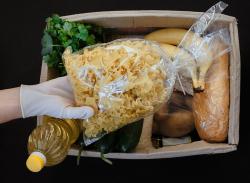Staying Healthy – SMART Goals and Healthy Food Choices
Recipes and Nutrition Tips - Challenge Yourself to Try New Fruits and Vegetables
Physical Activity Tips - Learn about SMART Goals and Use Them for Your Fitness Goals
Food Access Resources in Massachusetts - HIP and P-EBT benefits, Project Bread, SNAP, WIC, USDA
Staying Healthy
 Get motivated to set SMART goals and improve your lifestyle.
Get motivated to set SMART goals and improve your lifestyle.
Goal setting is helpful, whether it’s related to your health, finances, or job. The acronym will guide you toward making your goals easier to reach.
S – Specific: Make your goals as clear and simple as possible.
M – Measurable: Collect evidence that makes it easy to see progress.
A – Achievable: A goal should be realistic and possible for you to reach.
R – Relevant: Your goal should be related to what you want to accomplish.
T – Time-based: A goal should have a time frame or an end date.
Here are a few examples of SMART goals for healthy eating:
- I will add one vegetable to my lunch three times a week for the next month.
- I will replace my can of soda with seltzer water at dinner twice a week.
- Over the next two months, I will purchase a fruit I like from the grocery store.
Recipes and Nutrition Tips
 Spicy Baked Plantain Chips are a great snack.
Spicy Baked Plantain Chips are a great snack.
Plantains are a staple in many households and are a great source of potassium and fiber while providing 20% of your recommended daily vitamin A. Becasue they are not as sweet as their cousin the banana, they can be served as a starchy side dish. Some low-fat ways of cooking plantains are baking, boiling, and steaming. Just like other starchy sides, such as potatoes and grains, be aware of the fat (oil or butter) used when cooking and your portion size. Try this Spicy Baked Plantain Chips recipe for a delicious snack.
Check out this recipe video and watch how easy it is to make lower-fat crunchy baked veggies: https://www.eatgathergo.org/recipe/oven-fried-veggies/.
Physical Activity Tips
 Let’s practice writing a SMART goal for fitness.
Let’s practice writing a SMART goal for fitness.
- Go beyond the general goal and provide specific details. Replace “I want to exercise more” with “I want to walk one mile three times per week.”
- Keep track of your measurable progress. Give yourself small goals to help reach the larger one, such as “By the end of the month I want to be able to walk a slow mile.”
- Make sure the goal is achievable with your current situation, location, and lifestyle. For example, if your goal is to swim three times per week but you do not have access to a pool, you would have a hard time making this goal a reality.
- Recognize where you are starting from and make sure your activity is relevant to your goal. Saying “I want to run a marathon in a month” might be unrealistic if you have difficulty running a mile.
- Set a timeline for the goal. For example, say “By March 1st, I want to walk a fast-paced mile three times per week” and by April 1, “I want to walk two fast-paced miles three times per week.“ For more information about setting fitness and nutrition goals, visit: www.canr.msu.edu/news/setting_your_nutrition_and_physical_activity_goal.
Food Access Resources in Massachusetts
 Healthy Incentives Program – It’s HIP to Be Healthy! Massachusetts residents can use their HIP benefits at winter farmers’ markets. To locate markets near you, visit this interactive map.
Healthy Incentives Program – It’s HIP to Be Healthy! Massachusetts residents can use their HIP benefits at winter farmers’ markets. To locate markets near you, visit this interactive map.
P-EBT provides food support to help families with children who receive free and reduced-price school meals. If you think your student qualifies but you did not receive a card or a letter in October, call the DTA Assistance Line at 877-382-2363.
Project Bread – Learn about food assistance resources available to the Massachusetts residents. Visit ProjectBread.org or call Project Bread's Food Source Hotline at 1-800-645-8333. This number is toll-free and confidential. Hotline hours: Monday–Friday, 8am to 7pm; Saturday, 10am to 2pm.
SNAP – You may be eligible for the Massachusetts Supplemental Nutrition Assistance Program (SNAP), which provides monthly food benefits to individuals and families who qualify. Apply for SNAP benefits and learn more about recipes and healthy eating through SNAP education.
The Massachusetts Women, Infants, and Children (WIC) Nutrition Program – WIC is a free nutrition program that provides healthy foods, nutrition education, breastfeeding support, referrals to healthcare, and other services to Massachusetts families who qualify. You can check your eligibility and apply for WIC online.
USDA extends free meals for kids through June 30, 2021. The U.S. Department of Agriculture (USDA) extends summer meal programs to continue serving free meals to all children. For more information, visit https://meals4kids.org/find-summer-meal-site to find free meals for kids. If you have questions about receiving meals from your school district, contact them directly.
To learn more about nutrition education lessons provided by the UMass Extension Nutrition Education Program, visit https://ag.umass.edu/nutrition.